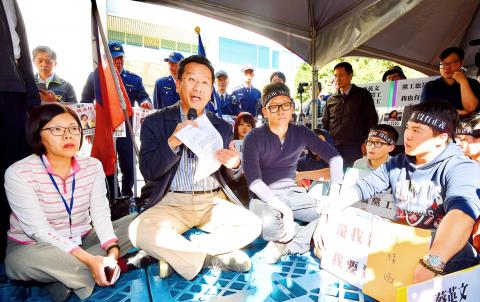Ill-gotten Party Assets Settlement Committee Chairman Wellington Koo (顧立雄) yesterday confirmed the failure of an attempt to reach a deal with the Chinese Nationalist Party (KMT) over controversial assets owned by the party and two companies affiliated with it.
According to an article in the Chinese-language United Evening News, the committee was close to reaching an administrative contract with the KMT over the assets of two KMT-owned companies — Central Investment Co (中央投資公司) and Hsinyutai Co (欣裕台) — as well as nine checks issued under a KMT account worth NT$468 million (US$14.64 million), but the KMT terminated negotiations with the committee.
Under the terms of the contract, the KMT would be obligated to transfer 55 percent of its holdings in the two companies to the government and donate the remaining 45 percent to fund long-term care and healthcare services.

Photo: Peter Lo, Taipei Times
The committee last month declared the two companies — which have a combined value of about NT$15.6 billion — KMT-affiliated organizations, and said they should be transferred to the state since they were founded using illegally obtained assets, but the Taipei High Administrative Court on Friday last week suspended the transfer.
Koo yesterday confirmed the existence of the contract, but denied accusations that the committee was engaged in under-the-table dealings.
“The Administrative Procedure Act (行政程序法) authorizes government authorities to negotiate an administrative contract, and the committee is not the first agency attempting to reach such a contract with a civic group,” Koo said.
“KMT Vice Chairman Steve Chan (詹啟賢) took the initiative to contact and negotiate with the committee over the ordered transfer of Central Investment and Hsinyutai to the government, as well as the nine checks” frozen by the committee, he said.
Koo reiterated that it was not the committee that took the initiative, adding that the negotiations were conducted according to the law and with the participation of the Ministry of Justice and the Ministry of Finance, but the committee failed to reach an agreement with the KMT.
Koo said he did not understand why the KMT backed out of the contract, but speculated that Chan might not be fully authorized to negotiate such an agreement.
Meanwhile, KMT members yesterday protested outside the committee’s headquarters over a freeze on KMT bank accounts, which they said prevented the party from paying salaries and pensions, and they demanded that the committee allow the KMT to make the payments.
Showing a document the committee issued to the KMT, Koo told the protesters that the committee had allowed the party to access about NT$922 million from the nine checks and a KMT account, as well as a payment owed to the KMT by the Chang Yung-fa Foundation (張榮發基金) to pay for party employees’ salaries, pensions and health insurance.
“I do not know why the KMT did not tell you” about the committee’s decision, he said.

The CIA has a message for Chinese government officials worried about their place in Chinese President Xi Jinping’s (習近平) government: Come work with us. The agency released two Mandarin-language videos on social media on Thursday inviting disgruntled officials to contact the CIA. The recruitment videos posted on YouTube and X racked up more than 5 million views combined in their first day. The outreach comes as CIA Director John Ratcliffe has vowed to boost the agency’s use of intelligence from human sources and its focus on China, which has recently targeted US officials with its own espionage operations. The videos are “aimed at

STEADFAST FRIEND: The bills encourage increased Taiwan-US engagement and address China’s distortion of UN Resolution 2758 to isolate Taiwan internationally The Presidential Office yesterday thanked the US House of Representatives for unanimously passing two Taiwan-related bills highlighting its solid support for Taiwan’s democracy and global participation, and for deepening bilateral relations. One of the bills, the Taiwan Assurance Implementation Act, requires the US Department of State to periodically review its guidelines for engagement with Taiwan, and report to the US Congress on the guidelines and plans to lift self-imposed limitations on US-Taiwan engagement. The other bill is the Taiwan International Solidarity Act, which clarifies that UN Resolution 2758 does not address the issue of the representation of Taiwan or its people in

US Indo-Pacific Commander Admiral Samuel Paparo on Friday expressed concern over the rate at which China is diversifying its military exercises, the Financial Times (FT) reported on Saturday. “The rates of change on the depth and breadth of their exercises is the one non-linear effect that I’ve seen in the last year that wakes me up at night or keeps me up at night,” Paparo was quoted by FT as saying while attending the annual Sedona Forum at the McCain Institute in Arizona. Paparo also expressed concern over the speed with which China was expanding its military. While the US

SHIFT: Taiwan’s better-than-expected first-quarter GDP and signs of weakness in the US have driven global capital back to emerging markets, the central bank head said The central bank yesterday blamed market speculation for the steep rise in the local currency, and urged exporters and financial institutions to stay calm and stop panic sell-offs to avoid hurting their own profitability. The nation’s top monetary policymaker said that it would step in, if necessary, to maintain order and stability in the foreign exchange market. The remarks came as the NT dollar yesterday closed up NT$0.919 to NT$30.145 against the US dollar in Taipei trading, after rising as high as NT$29.59 in intraday trading. The local currency has surged 5.85 percent against the greenback over the past two sessions, central